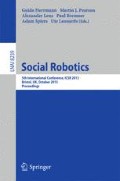Abstract
Previous work shows that other people are evaluated more positively when they are perceived as part of the evaluator’s ingroup. This phenomenon – ingroup bias – has been robustly documented in social psychological intergroup research. To test this effect to the domain of social robots, we conducted an experiment with 61 Caucasian (White) American participants who rated either a robot that resembled the participants’ Caucasian ingroup or a social outgroup on mind perception (i.e., the attribution of agency and experience). First, we predicted that the ingroup robot would be evaluated more positively than the outgroup robot. Moreover, we assessed the Caucasian Americans’ endorsement of anti-Black prejudice. Thus, second, we hypothesized interaction effects of robot type and level of prejudice on mind perception, meaning that effects of ingroup bias should be particularly pronounced under high (vs. low) levels of self-reported Anti- Black prejudice. Interestingly, we did not obtain main effects for robot type on mind perception. Contrary to our hypothesis, participants even seemed to attribute more agency and experience to the outgroup robot relative to the ingroup robot. As expected, no main effects for levels of prejudice on mind perception emerged. Importantly, however, we obtained the predicted interaction effects on the central dependent measures. Obviously, the interplay of design choices and user attitudes may bias anthropomorphic inferences about robot companions, posing a psychological barrier to human-robot companionship and pleasant human-robot interaction.
Access this chapter
Tax calculation will be finalised at checkout
Purchases are for personal use only
Preview
Unable to display preview. Download preview PDF.
References
Epley, N., Waytz, A., Cacioppo, J.T.: On Seeing Human: A three-factor theory of anthropomorphism. Psychological Review 114, 864–886 (2007)
Epley, N., Waytz, A., Akalis, S., Cacioppo, J.T.: When we need a human: Motivational determinants of anthropomorphism. Social Cognition 26, 143–155 (2008)
Eyssel, F., Kuchenbrandt, D.: Social categorization of social robots: Anthropomorphism as a function of robot group membership. British Journal of Social Psychology 51, 724–731 (2012)
Fiske, S.T.: Stereotyping, prejudice, and discrimination. In: Gilbert, D.T., Fiske, S.T., Lindzey, G. (eds.) Handbook of Social Psychology, pp. 357–411. McGraw-Hill, New York (1998)
Eyssel, F., Hegel, F.: (S)he’s got the look: Gender-stereotyping of social robots. Journal of Applied Social Psychology 42, 2213–2230 (2012)
Kuchenbrandt, D., Eyssel, F., Bobinger, S., Neufeld, M.: When a robot’s group membership matters: Anthropomorphization of robots as a function of social categorization. International Journal of Social Robotics 5, 409–417 (2013)
Eyssel, F., Kuchenbrandt, D., Hegel, F., de Ruiter, L.: Activating elicited agent knowledge: How robot and user features shape the perception of social robots. In: Proceedings of the 21st IEEE International Symposium in Robot and Human Interactive Communication, pp. 851–857 (2012)
Gaertner, S.L., Dovidio, J.F.: Reducing intergroup bias: the common ingroup identity model. Psychology Press, New York (2000)
Escalas, E.J., Bettman, J.R.: Self-construal, reference groups, and brand meaning. Journal of Consumer Research 32, 378–388 (2005)
White, K., Dahl, D.W.: Are all out-groups created equal? Consumer identity and dissociative influence. Journal of Consumer Research 34, 525–535 (2007)
Haslam, N.: Dehumanization: An integrative review. Personality and Social Psychology Review 10, 252–264 (2006)
Swim, J.K., Aikin, K.J., Hall, W.S., Hunter, B.A.: Sexism and racism: Old-fashioned and modern prejudices. Journal of Personality and Social Psychology 68, 199–214 (1995)
Eyssel, F., Kuchenbrandt, D.: Manipulating anthropomorphic inferences about NAO: The role of situational and dispositional aspects of effectance motivation. In: Proceedings of the 20th IEEE International Symposium in Robot and Human Interactive Communication, pp. 467–472 (2011)
Hegel, F., Eyssel, F., Wrede, B.: The social robot Flobi: Key Concepts of industrial design. In: Proceedings of the 19th IEEE International Symposium in Robot and Human Interactive Communication, pp. 120–125 (2010)
Gray, H.M., Gray, K., Wegner, D.M.: Dimensions of mind perception. Science 315, 619 (2007)
Eyssel, F., Reich, N.: Loneliness makes my heart grow fonder (of robots)? On the effects of loneliness on psychological anthropomorphism. In: Proceedings of the 8th ACM/IEEE Conference on Human-Robot Interaction (HRI 2013), pp. 121–122 (2013)
McConahay, J.B.: Modern racism, ambivalence, and the Modern Racism Scale. In: Dovidio, J.F., Gaertner, S.L. (eds.) Prejudice, Discrimination, and Racism, pp. 91–125. Academic Press, Orlando (1986)
Sears, D.O.: Symbolic racism. In: Katz, P., Taylor, D. (eds.) Eliminating Racism: Profiles in Controversy, pp. 53–84. Plenum Press, New York (1988)
Devine, P.G.: Stereotypes and prejudice: Their automatic and controlled components. Journal of Personality and Social Psychology 56, 5–18 (1989)
Ferguson, C.K., Kelley, H.H.: Significant factors in overevaluation of own-group’s product. The Journal of Abnormal and Social Psychology 69, 223–228 (1964)
Powers, A., Kiesler, S.: The advisor robot: Tracing people’s mental model from a robot’s physical attributes. In: Proceedings of the Conference on Human-Robot Interaction, pp. 218–225 (2006)
Powers, A., Kramer, A.D.I., Lim, S., Kuo, J., Lee, S.-L., Kiesler, S.: Eliciting information from people with a gendered humanoid robot. In: Proceedings of the 14th IEEE International Workshop on Robot and Human Interactive Communication, pp. 158–163 (2005)
Reeves, B., Nass, C.: The media equation: How people treat computers, television, and new media like real people and places. Cambridge University Press, New York (1996)
Author information
Authors and Affiliations
Editor information
Editors and Affiliations
Rights and permissions
Copyright information
© 2013 Springer-Verlag Berlin Heidelberg
About this paper
Cite this paper
Eyssel, F., Loughnan, S. (2013). “It Don’t Matter If You’re Black or White”?. In: Herrmann, G., Pearson, M.J., Lenz, A., Bremner, P., Spiers, A., Leonards, U. (eds) Social Robotics. ICSR 2013. Lecture Notes in Computer Science(), vol 8239. Springer, Cham. https://doi.org/10.1007/978-3-319-02675-6_42
Download citation
DOI: https://doi.org/10.1007/978-3-319-02675-6_42
Publisher Name: Springer, Cham
Print ISBN: 978-3-319-02674-9
Online ISBN: 978-3-319-02675-6
eBook Packages: Computer ScienceComputer Science (R0)

